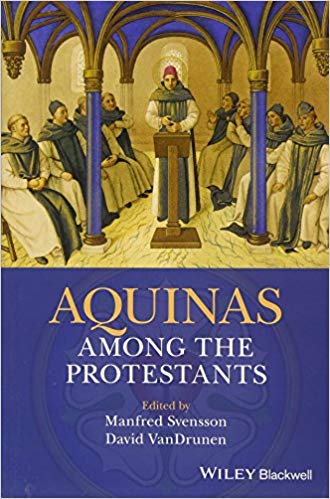The times they are certainly a-changing, at least for thoughtful Protestants. Thomas Aquinas, for centuries the object of fear and dread among the followers of Luther and Calvin, is finally receiving his due among the “separated brethren” as a key Christian thinker. And I say this as one of those separated brethren.
Historical research over the last fifty years has established clear continuities, and often significant points of dependence, between later Protestant thinkers and the Angelic Doctor. And the dogmatic implications of this are now obvious: significant points of overlap exist theologically between classical, confessional Protestantism and the theology of which Aquinas was a representative, particularly on the doctrine of God and orthodox Trinitarianism. There is also increasing appreciation for Thomas as an influential Christian advocate of natural law—a point that should interest not just theologians, but all Christians at this time of ubiquitous and confusing ethical conflicts.
As part of this retrieval, Manfred Svensson and David VanDrunen have assembled an outstanding collection of essays, Aquinas Among the Protestants. The essays examine numerous aspects of Thomas’s thought and bring these into constructive relationship with contemporary Protestant Christianity.
Why Have Protestants Historically Rejected Thomas?
Start your day with Public Discourse
Sign up and get our daily essays sent straight to your inbox.Behind the traditional Protestant rejection of Thomas lie a number of convictions. First, there is the general rhetoric of the Reformers, which dismissed the medieval schoolmen as the intellectual defenders of a corrupt and theologically deviant church. Second, there were particular points of repudiation, such as the sacraments and justification. Third, there is the more recent tendency (something of a twentieth-century Protestant preoccupation) to reject Thomas because of his high view of human reason and of natural theology. The most famous advocate of this latter point was Swiss theologian Karl Barth, but the concern was also shared by other, more traditional theological figures.
These are formidable obstacles for any Protestant who wants to approach Aquinas with an open mind. But there is a further complication for anyone wishing to engage constructively with him: the reception history of his thought. As with many great thinkers, Thomas has been the subject of competing interpretations by those who would claim to be his allies. Most significant in this regard is Cardinal Cajetan in the sixteenth-century. He sharpened the distinction between nature and grace and arguably led later Thomists down a path that is vulnerable to the third Protestant criticism noted above. Still, one should not automatically impute the theological sins of the children to the parent.
The essays in this volume address all of the above issues. On the matter of the Reformers’ rhetoric, it is a basic point of historical method that one must always look at what authors do with an idea or a thinker, not simply what they say about them. Behind the black-and-white anti-scholastic rhetoric, there was a much subtler reception of medieval thought. In fact, Thomas proved to be a very important source for Protestants, particularly on the matter of the doctrine of God and the articulation of Trinitarianism.
This use of Thomas did not turn Protestants into “Thomists” in any party sense. To understand Aquinas not so much as the fountainhead of a monolithic tradition but as one (admittedly outstanding) thinker within a broad tradition of Western theology is a simple, even obvious, point, but it is one that needs to be stressed in the face of Protestant claims to the contrary. To reject Thomas in a comprehensive manner demands the rejection of key elements of the broad catholic tradition of which orthodox Protestantism is a part, among which we can count divine simplicity, impassibility, and thus even classical Trinitarianism.
Specific Points of Disagreement
This has implications for the second category of Protestant criticism, that of the repudiation of Thomas on specific points. Certainly, his understanding of the sacraments and their function in salvation is universally rejected by the Reformation Protestant tradition. But claims that his metaphysics necessarily demand his sacramentology, for example, seem misplaced.
The standard Protestant narrative on which this claim depends—that Aquinas represents theology perverted by Aristotle—fails to take account of several important points. For one thing, transubstantiation (on which Aristotle appears to have held no strong opinions) uses notions of substance and accidents in a manner alien to the Philosopher (a point highlighted by John Wycliffe in the fourteenth-century). In addition, Aristotelianism continued to dominate intellectual life in the sixteenth and seventeenth centuries and was neither displaced nor significantly disrupted by the Protestant Reformation. The various medieval metaphysical traditions that took their cue from the Aristotelian corpus (and the commentary tradition thereon) remained the philosophical air that the Reformers and their successors breathed, Luther’s rhetoric notwithstanding. Indeed, Peter Martyr Vermigli even added to the Aristotelian commentary tradition with his published lectures on the Ethics.
This connection to Aristotle did not require them to endorse either medieval sacramentology or Tridentine notions of salvation. Eclecticism was the order of the day for the Reformers when they engaged scholastic thought, as decades of historical scholarship have now demonstrated in meticulous detail and as the contributors to this volume point out again and again.
Human Reason and Natural Theology
This brings us to the third Protestant criticism: that of Aquinas’s alleged high view of human reason and his unguarded place for natural theology. Many of the essays touch on this point. Of course, the very clear statement on the very limited competence of human reason that Aquinas makes in the very first question of the Summa Theologiae is referenced by a number of the contributors, such as Michael Allen, Scott Swain, and especially Paul Helm. Jordan Ballor, in a very useful historical introduction, provides the narrative by which Aquinas came to be misunderstood on this point. The era of the default Protestant assumption that the Cajetanian reading of Aquinas is the correct one is truly coming to an end.
Accuracy on the point of nature and grace, reason and revelation, is crucial if Thomas is to prove helpful to Protestants. Faced with a plethora of ethical and political challenges, Protestants have found in recent years that they lack a comprehensive tradition of social and moral teaching. A generation of younger Christians is rising who wish to take the Bible seriously but struggle to understand why it says what it does about difficult topics such as homosexuality. The time is ripe for Protestants to engage in serious reflection on natural law, on the significance of embodiment, on the nature of Christian community, and on what it means for the church to be the body of Christ. In the past, historic, orthodox Protestantism has, at least to some extent, done all of these things. But sadly, the twentieth-century polemics against natural theology—combined with a rather inauspicious tradition of Protestant misunderstanding of Thomas—have contributed to those parts of the Protestant tradition being radically attenuated, falling into neglect, or even paradoxically being repudiated as a mark of orthodoxy.
On this point, Helm’s essay is outstanding, including his reminder of points of similarity between Aquinas and Calvin on natural law—a point that he could have made with even more pungency had he drawn not simply on the Summa but also on Thomas’s commentary on Romans. Thomas was, after all, first and foremost a doctor of the sacred page, even if he is now generally treated more as a philosopher or philosophical theologian.
There are also areas where Protestantism has not followed Thomas where a change of direction might now be useful. In his essay, John Fesko notes that the rejection of the notion of infused habits in general has led to the loss of virtue ethics in Protestant thought. As he notes, infused habits were a typical element in much of the Reformed theology of the later sixteenth and seventeenth centuries, even if not constitutive of justification. Still, even in earlier Protestantism, Aquinas’s moral teaching was typically located not in any discussion of the virtues but rather in explications of the law, as Daniel Westberg’s essay shows.
Why Protestants Should Reconsider Thomas
Given the current state of moral confusion in society and the rampant effects of emotivism and expressive individualism on public life and discourse, the notion of virtues and of moral formation within communities has come to the fore. Again, Thomas’s vision of the Christian life may not be one that Protestants can swallow in its entirety, but his understanding of human psychology and the connection between what we would now call character and ethical decision-making is a compelling one. We do not want to see Christians who follow the rules simply because they are the rules. We want to see Christians who follow the rules because they know that the rules make sense within a fully-orbed understanding of what it means to be human and who have cultivated that virtuous way of thinking so that it has become, in a very real sense, part of who they are.
Protestants who reject Thomas tout court need to understand the consequences of their position and carefully count the cost. First, they detach themselves historically from the traditions of theology that lie at the heart of their own confessional documents. Orthodox Protestantism was consistent with Thomas on significant points of theology, and for good reason: the creedal, classical doctrine of God rested on a tradition of metaphysics that both shared. And second, these Protestant nay-sayers thereby place themselves under the weighty obligation to demonstrate that their repudiation of Thomas does not therefore detach them from both classical Reformation Protestantism and even catholic Christian orthodoxy. They need to beware lest they end up throwing out the orthodox theological baby along with the sacramental baptismal water.
It is time for the fruits of recent historical and theological scholarship to be harvested in the churches of the Reformation and helpfully applied to the many challenges, internal and external, theological and ethical, that we all now face. This book is a fine start to precisely such a needed recovery.














